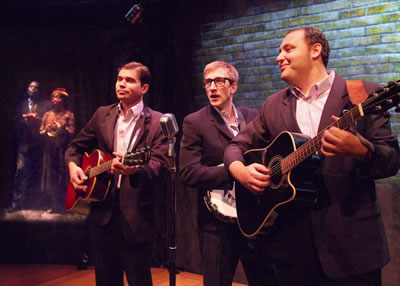
Pete Seeger, Woody Guthrie, the Carter family, the Weavers, the Kingston Trio, Leadbelly, Odetta, Joan Baez, Peter, Paul and Mary and Bob Dylan. To many, those musical icons, along with countless lesser knowns singing and playing in homes, fields and churches, represent the spirit of America to audiences here and abroad.
Their voices provide the historical cues for the musical revue “Lonesome Traveler: A Journey Down the Rivers and Streams of American Folk,” now playing at Laguna Playhouse through Feb. 5. It highlights what was the music of immigrants, slaves, prisoners, sharecroppers and plain folk who sang and played what was in their hearts: homages to their creator, tribulations of love, worries of those outside the law, and rage against “the man.”
“We’re traveling in the footsteps of those who came before,” said the show’s originator, James O’Neil, who grew up loving the music of Seeger, Guthrie and their contemporaries.
It’s a line that the Traveler, a character skillfully embodied by Justin Flagg, uses in the narration forming the scaffolding of the show.
The theme song “Lonesome Traveler” was recorded by Seeger and the Weavers in the 1950s. The revue, though, premiered at Ventura’s Rubicon Theatre Company, which O’Neil co-founded with his wife in 1998. The show has undergone some slight adaptations for its Laguna Playhouse premiere.
It took O’Neil four years to write and select the songs arranged by Dan Wheetman and brought to life by a company whose acting, singing and musicianship carry the two and a half hour show. Costumes, mostly loosely fitted shifts for women, shirts and pegged pants for men, along with some notable wigs, strive for authenticity. Nicholas Mongiardo-Cooper as “the preacher,” Anthony Manough as “Leadbelly and Harry Belafonte” and Jennifer Leigh Warren’s vocal range and physical versatility stand out.
O’Neil emphasizes that the show is neither about nostalgia nor the influence of the current political climate. “Deportee (Plane Wreck over Los Gatos)” is about as topical as things get, while “Talkin’ Union,” “Do Re Mi” and “Hallelujah, I’m a Bum” are reminders of how the more things change, the more they stay the same. “My dad was born in 1910. Woody Guthrie was his contemporary and their ethics form the main thread throughout the show,” said O’Neil, who keeps his father’s old LP record collection.
The Playhouse sets suggest New York coffeehouses, an early recording studio, a run-down home or a jailhouse cell. Two suspended television screens add an incongruous touch by showing images of Occupy sites, even though there is no mention of the protests over income inequality in the program. On stage, history stops with Vietnam antiwar protests and the civil rights movement, represented by a moving rendition of “We Shall Overcome.”
The show begins with the hymn “Will the Circle Be Unbroken,” recorded by the Carter family in the 1950s, but then shifts between musical eras from the ‘20s to the ‘60s. Judging by some intermission chatter, some sets of middling medleys could be omitted.
The ‘50s and ‘60s are well represented with the melancholy “In the Early Morning Rain” and “Jamaica Farewell,” the very funny “Zombie Jamboree,” and Bob Dylan’s “Maggie’s Farm,” and “It’s All Over Now, Baby Blue.”
Saturday’s opening night reached its zenith when the cast and audience, at first timid, joined in a rousing rendition of “This Little Light of Mine.”




